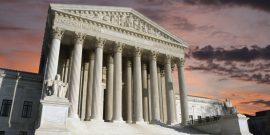Whelan on McGinnis and Rappaport’s Originalism and the Good Constitution: Part I -- The Normative Justification
(This post is written jointly by John McGinnis and Mike Rappaport)
Ed Whelan has read our book and is kind enough to describe it as “an impressive work, rich with interesting and intelligent arguments.” And he writes, “Their book will surely play a prominent role in the ongoing debate over originalism.”
Ed does, however, offer some criticisms in his two posts on our book. In this and the next post, we will respond to some of his arguments.
First, Ed questions whether our consequentialist defense of originalism – as involving a good Constitution that should be enforced – is really the best normative defense of originalism. He first notes that we reject the notion that following the law is the best defense of originalism. He then states:
To state my point more affirmatively: I find much more appealing the normative argument for originalism that law professor Lawrence B. Solum makes in his long law-review article “Semantic Originalism” (pp. 149-160). That argument, at its essence, is that in a “reasonably just society” like ours, it’s wrong to lie about the meaning of the Constitution. . . . Even in the collapsing state of our culture, the proposition that it’s generally wrong to lie seems to me to retain broad appeal.
We are not exactly sure what Ed is proposing as the best normative defense of originalism. On the one hand, he might be arguing that we should follow the original meaning, because it is the law. If that is his argument, then we would point to Mike Rappaport’s earlier post rejecting this argument. In particular,
another problem with the argument that the original meaning of the Constitution is the law that it is not clear that it is true. What does it mean to say that the Constitution’s original meaning is the law? Certainly, people are in jail in the U.S. – lots of them – for violating laws that are inconsistent with the Constitution’s original meaning. More generally, nonoriginalist Supreme Court decisions are enforced without a second thought by most people all the time.
But perhaps Ed means something else – perhaps he is basing his argument simply on the obligation not to lie. We have a couple of concerns about this.
First, if it turns out that the original meaning is the not the law – or at least not the only reasonable take on the law – because let’s say that the rule of recognition treats the nonoriginal meaning as the law, then judges need not be lying by enforcing a nonoriginalist constitution. They are enforcing the law and the law allows nonoriginal meaning. So long as they don’t say that the nonoriginal meaning is the original meaning, no lying need be occurring.
Second, even if judges are mistaken that the nonoriginal meaning can be the law, that does not mean they are lying about the matter. They could simply be mistaken. Now, one might say that judges should not be mistaken – of course, they shouldn’t – but they don’t know that they are being mistaken and so it is not clear how helpful that guidance would be.
Third, telling judges not to lie is not the same as telling them to enforce the original meaning. A judge might respond by admitting that he is not enforcing the original meaning. He then is not lying and is still not enforcing the original meaning. Of course, one might wonder whether the judges would be willing to admit this (and what the public reaction would be), but it is quite possible that they would admit it and then “the do not lie argument” would have no traction. In fact, some judges come pretty close to admitting as much, such as Judge Richard Posner.

